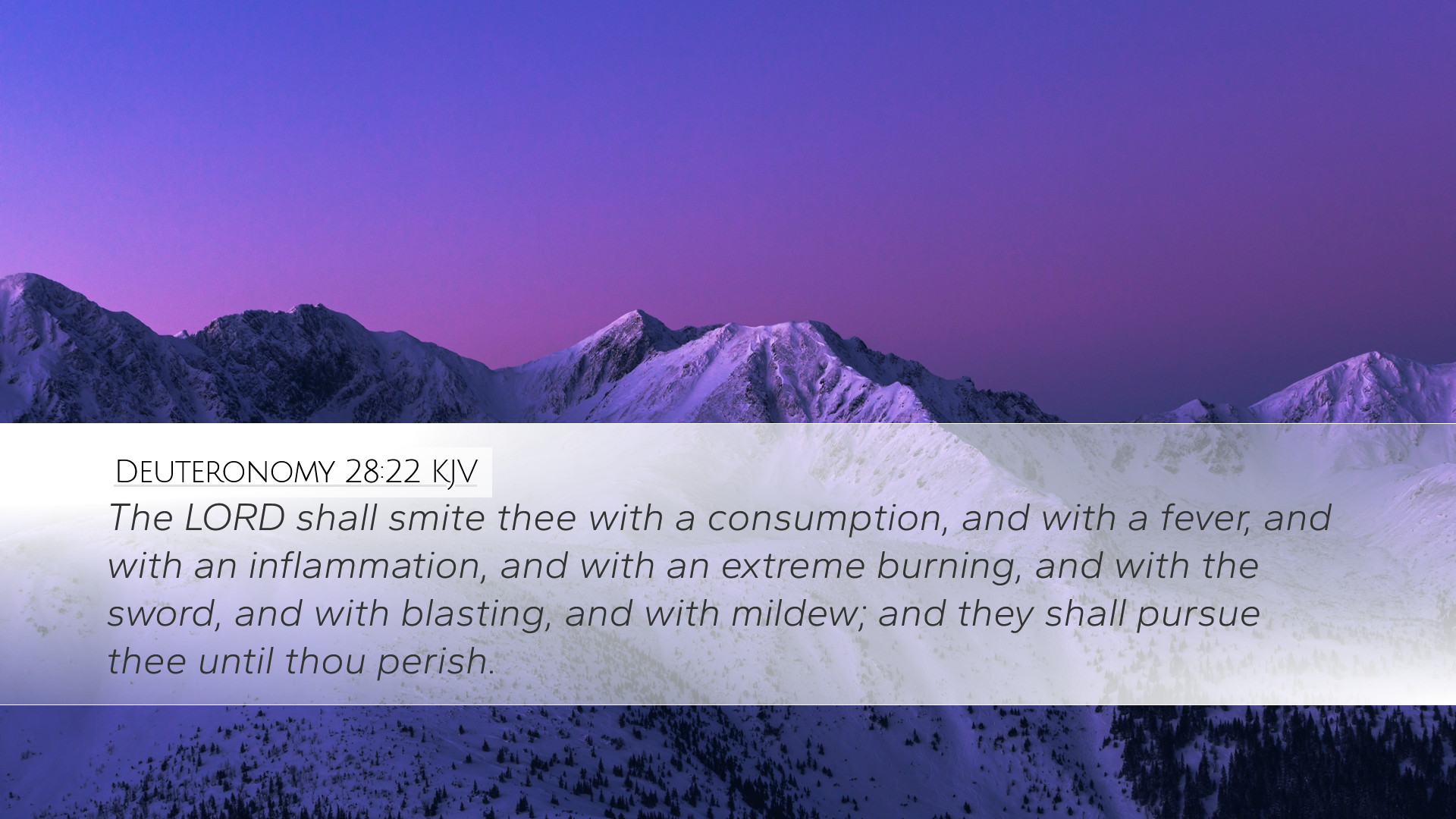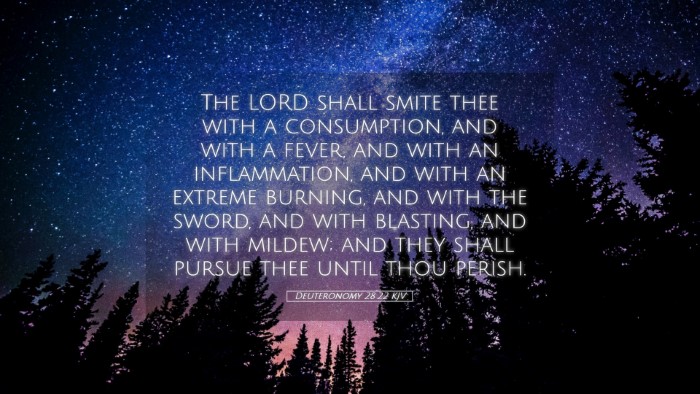Commentary on Deuteronomy 28:22
Deuteronomy 28:22 states: "The LORD will strike you with wasting disease, with fever and inflammation, with scorching heat and drought, with blight and mildew, which will plague you until you perish." This verse forms part of a larger section, often referred to as the blessings and curses, wherein God outlines the covenantal promises to Israel based on their adherence to His commandments.
Contextual Background
The Book of Deuteronomy is mainly understood as Moses' farewell address to the Israelites before they enter the Promised Land. In Chapter 28, Moses enumerates both the blessings for obedience to God's law and the extensive curses for failure to comply. This verse specifically falls within the category of curses, articulating the consequences of straying from God’s covenant.
Analysis of the Verse
In this verse, the consequences are severe and numerous, reflecting the serious nature of disobedience. Each term used to describe these punishments—wasting disease, fever, inflammation, scorching heat, drought, blight, and mildew—carries weight and implications that are meaningful for the Israelites.
Wasting Disease
Matthew Henry remarks that "wasting diseases" refer to those ailments that diminish physical strength and vitality. It evokes the image of a gradual decline, symbolizing how sin leads to spiritual decay akin to physical deterioration.
Fever and Inflammation
Albert Barnes highlights that fever and inflammation may correspond to both physical ailments and emotional turmoil. The presence of such diseases serves as a divine manifestation of God's displeasure, causing both physical suffering and psychological distress within the community.
Scorching Heat and Drought
Adam Clarke adds further insight into "scorching heat and drought." He interprets these as metaphorical references to the absence of God's blessing upon the land, which can lead to famine and societal collapse—a stark warning that disobedience alienates Israel from the life-giving sustenance of God.
Blight and Mildew
The references to blight and mildew specifically relate to agricultural failures. Matthew Henry notes that such references are particularly poignant for a nation dependent on agriculture, as they symbolize not only physical ruin but also economic and social calamity. The idea that even the earth, which should yield fruit, would withhold its bounty emphasizes the severity of turning away from God.
Theological Implications
This verse raises several theological implications worthy of exploration:
- The Nature of God’s Covenant: The conditionalities of God's covenant imply an intimate relationship between obedience and divine favor. The curses articulate the seriousness of the covenant, emphasizing that straying from God invites significant consequences.
- Divine Justice and Mercy: The proclamation of curses serves a dual role—it serves as a warning to prevent sin while simultaneously invoking the idea of divine retribution. It reminds the faithful that while God is merciful, He is also just, and He does not overlook transgressions.
- The Holistic Impact of Sin: The various forms of punishment demonstrate that sin impacts all aspects of existence: physical, emotional, social, and spiritual. This comprehensive view encourages believers to reflect on the broad implications of disobedience beyond personal sin.
- The Importance of Community: The communal nature of these punishments implies that individual obedience affects the community as a whole. This collective responsibility serves as a reminder for communities to uphold righteousness and encourage one another in faithfulness to God's commands.
Contemporary Application
For contemporary readers, especially pastors, theologians, and students, this verse offers points for reflection:
- Call to Obedience: The verse serves as a stark reminder of the importance of adherence to God’s commandments in a world where moral relativism is prevalent.
- Understanding Natural Disasters: It prompts discussions about the role of divine sovereignty in natural events, urging a balanced understanding that considers faith and stewardship of the earth.
- Community Accountability: Churches and communities today must recognize the importance of collective faithfulness and encourage one another in pursuing righteousness.
- Spiritual Health: This verse can serve as a metaphor for spiritual vitality, inviting believers to reflect on areas in their lives that may be spiritually 'withering' due to disobedience or neglect.
Conclusion
In conclusion, Deuteronomy 28:22 warns against disobedience and serves as a sobering reminder of the consequences that arise from turning away from God. While the severity of the curses may seem daunting, they ultimately point towards the need for repentance, reliance on God's grace, and an understanding of the deep connection between faithfulness and well-being. Pastors, students, and theologians should consider these insights carefully as they explore the richness of Scripture and its implications for life today.


